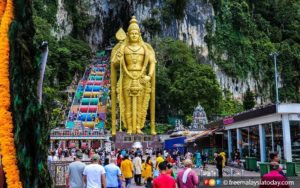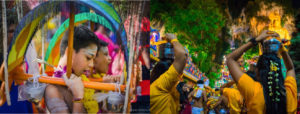 For the Hindu community in Malaysia, Thaipusam is one of the most important religious festivals of the year. The word ‘Thaipusam’ is the combination of the word “Thai”, which refers to the month of the Tamil calendar in which the Religious festival is held, and “Pusam” which refers to a constellation of three stars. The bright full moon in the sky during the month of Thai (between January 15 and February 15) marks the beginning of this festival, which is centered around the worship of Lord Murugan. With the upcoming Thaipusam festival around the corner, we wanted to get some insights on its origin and how it is celebrated. As such, this week’s installment of Jom Belajar is brought to you by our fantastic staff members, Athi Samynathan, Diana Anthonysamy and Teepa Cheelathurai! A big thank you to this amazing team for this contribution! Here’s what they had to say:
For the Hindu community in Malaysia, Thaipusam is one of the most important religious festivals of the year. The word ‘Thaipusam’ is the combination of the word “Thai”, which refers to the month of the Tamil calendar in which the Religious festival is held, and “Pusam” which refers to a constellation of three stars. The bright full moon in the sky during the month of Thai (between January 15 and February 15) marks the beginning of this festival, which is centered around the worship of Lord Murugan. With the upcoming Thaipusam festival around the corner, we wanted to get some insights on its origin and how it is celebrated. As such, this week’s installment of Jom Belajar is brought to you by our fantastic staff members, Athi Samynathan, Diana Anthonysamy and Teepa Cheelathurai! A big thank you to this amazing team for this contribution! Here’s what they had to say:
The Malaysian Hindu community notably celebrates Thaipusam in Batu Caves, a sacred place for adherents of the faith. Other places that are known for their Thaipusam festivities are the Arulmigu Balathandayuthapani Temple, also known as the Waterfall Hill Temple in Penang and the Arulmigu Subramaniyar Kallumalai Temple in Ipoh, Perak. Before welcoming Thaipusam, devotees fast or observe vegetarian practices for a certain period of time in order to purify their souls. On the day itself, devotees pledge their vows and pay penance with the carrying of the kavadi (a decorated structure bearing the image of Lord Muruga) on their shoulders or pal kodum (milk pots) carried above their heads.

A common way to wish someone who is celebrating this festival is to say: “Have a blessed Thaipusam”.
This year, Thaipusam falls on January 28, 2021. Due to the current COVID-19 situation, the festival proceedings will be more subdued than usual, as devotees have been requested to observe the traditions at home, rather than proceed to Batu Caves. Nonetheless, we wish everyone who is celebrating a very blessed Thaipusam!


